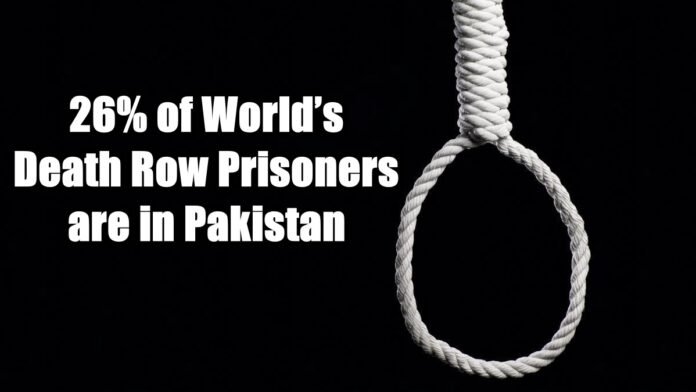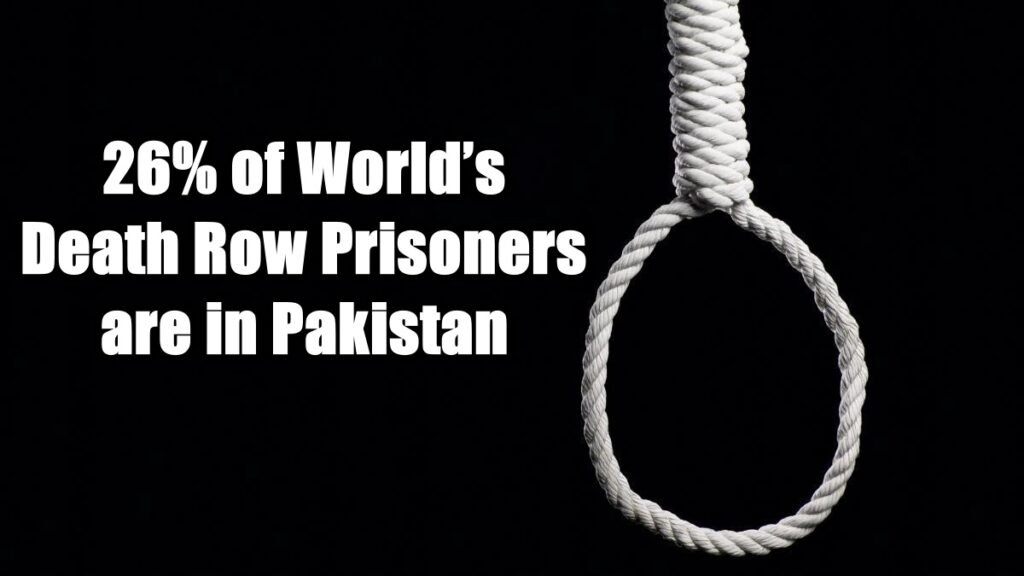
Islamabad: Pakistan is facing a critical human rights challenge as it emerges as one of the leading countries in the world in terms of the number of prisoners on death row. According to a recent report by the Lahore-based NGO Justice Project Pakistan (JPP), 26% of all prisoners globally facing the death penalty are in Pakistan. The report, released on Thursday, October 10, reveals that a staggering 6,161 prisoners were on death row in the country as of 2024, compared to 6,039 in 2023. This continuous rise marks a worrying trend, especially when compared to figures from previous years.
Shocking Growth in Death Penalty Cases Over Three Years
The JPP’s annual report, titled “Death Penalty in Pakistan: Data Analysis of Death Penalty,” presents a grim picture. In 2022, there were 3,226 prisoners sentenced to death in Pakistan, but that number has more than doubled within two years. By 2024, the total has surpassed 6,000, a disturbing increase that signals a surge in the use of capital punishment across the nation.
The report was released on the 22nd World Anti-Death Penalty Day, and it underscores the severity of Pakistan’s reliance on the death penalty. With 26% of the world’s death row population, Pakistan has become one of the most significant users of this ultimate form of punishment.
Provincial Breakdown: Punjab and Khyber Pakhtunkhwa Lead in Death Penalty Sentences
The regional distribution of death penalty cases is uneven across Pakistan, with some provinces showing a higher concentration of prisoners awaiting execution. The province of Punjab leads with 2,505 prisoners on death row, while Khyber Pakhtunkhwa follows closely behind with 2,311. These two provinces alone account for the majority of the country’s death row inmates, highlighting localized trends in the application of capital punishment.
Global Perspective: 13% of the World’s Death Row Prisoners are Pakistani
The report sheds light on the global impact of Pakistan’s death penalty policies. The country is home to 13% of all death row prisoners worldwide. Even more startling, every seventh prisoner globally sentenced to death is Pakistani, and every eighth person awaiting execution is also from Pakistan. These figures position Pakistan as one of the most prolific users of the death penalty, raising concerns among human rights organizations.
Death Penalty for 31 Crimes, But No Executions Since 2019
Despite the troubling increase in death sentences, the report notes that no execution has taken place in Pakistan since December 2019. However, the country’s legal framework still allows for the death penalty in over 31 different crimes, ranging from terrorism to blasphemy, drug trafficking, and murder. This legal provision creates a precarious situation for thousands of prisoners, many of whom face long waits on death row.
Global and Domestic Concerns Over Rising Death Penalty Numbers
Human rights organizations and advocates are deeply concerned about Pakistan’s growing death row population. The JPP’s report has sparked renewed calls for reform in the country’s judicial system. The growing use of the death penalty, coupled with a lack of executions, reflects a complex issue that requires urgent attention from both local policymakers and the international community. With Pakistan now accounting for over a quarter of the world’s death row prisoners, global pressure for reform is expected to mount.

Conclusion: A Call for Reform on World Anti-Death Penalty Day
As Pakistan marks another year of increasing death sentences, the JPP’s findings present a dire need for judicial reform. The country’s over-reliance on the death penalty stands in stark contrast to global trends where many nations are moving toward abolition. On this World Anti-Death Penalty Day, human rights organizations are calling on Pakistan to address the flaws in its justice system and reconsider the widespread use of capital punishment, which disproportionately affects thousands of its citizens.





















































